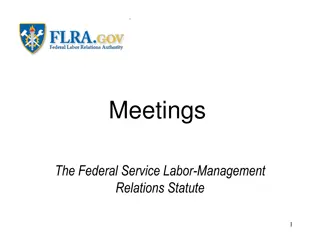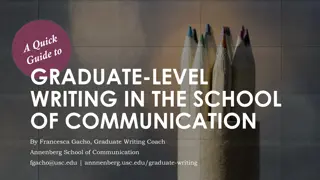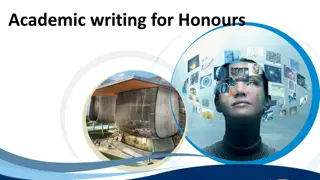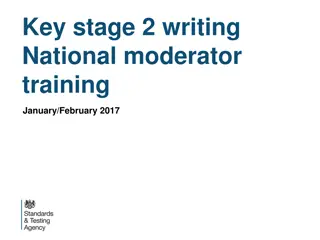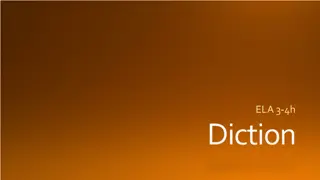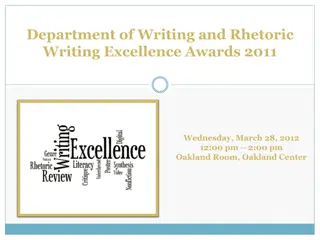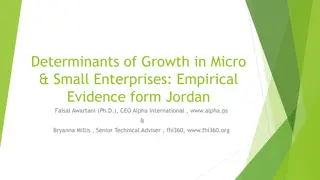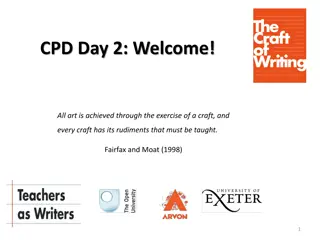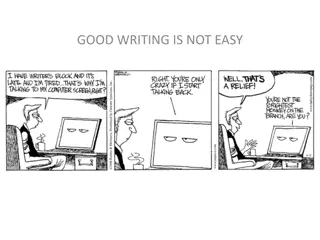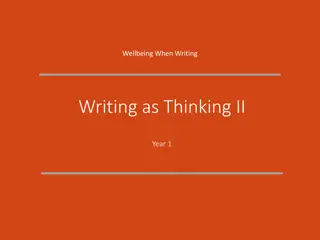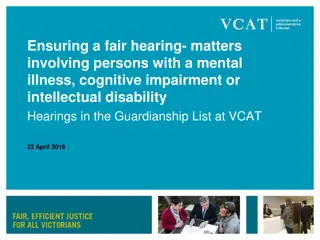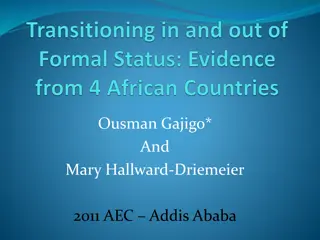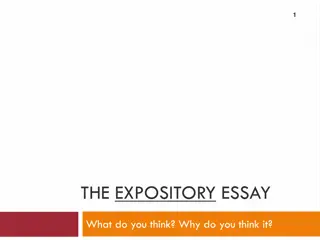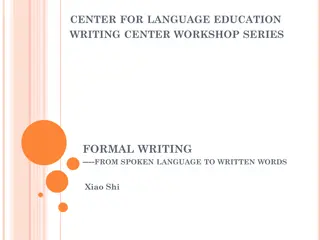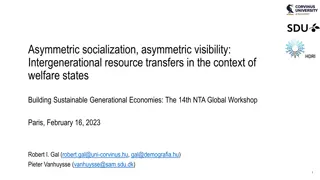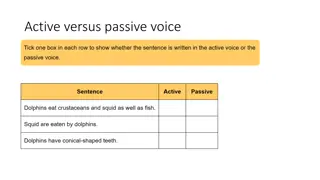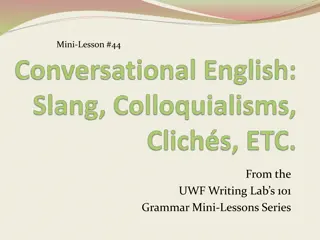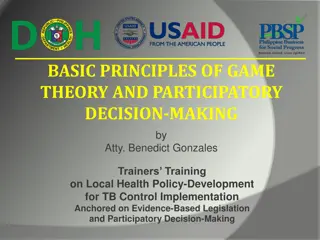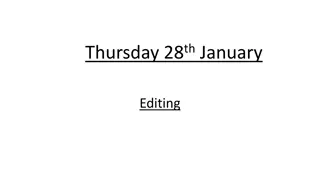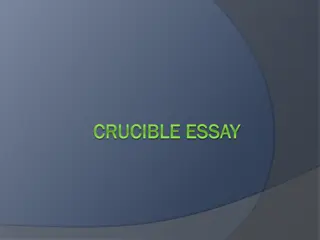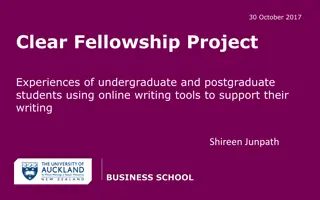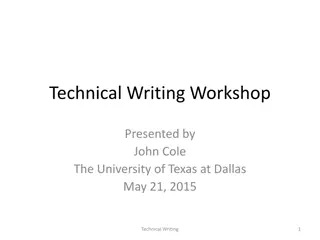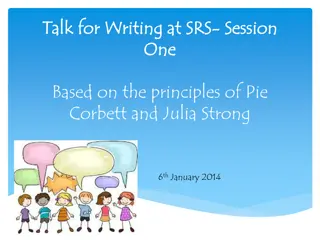Passive verb forms
Passive verb forms involve using "be" in a specific tense along with the past participle of a main verb to change the object of an active sentence into the subject of a passive sentence. The passive voice is commonly used in formal writing when the doer of the action is unknown, obvious, or purposel
2 views • 13 slides
Exploring Citizen Journalism and Non-Fiction Writing
Explore the world of citizen journalism and non-fiction writing, learning about text types, adapting writing to conventions, considering audience, purpose, and tone. Discover the significance and usefulness of non-fiction writing, and delve into creating various text types. Uncover the role of citiz
1 views • 11 slides
Comprehensive Overview of English Writing Course
This comprehensive English writing course, led by lecturer Muhammad Muslim Nasution, covers various aspects such as grammar, vocabulary, writing styles, and assessments. Students are required to actively participate, submit assignments, attend classes regularly, and produce writing projects. The cou
2 views • 8 slides
Understanding Formality in Meetings under the Federal Service Labor-Management Relations Statute
The Federal Service Labor-Management Relations Statute provides guidelines for formal discussions and investigative examinations in the context of labor relations. It outlines the rights of unions to representation in formal meetings, emphasizing the importance of subject matter and formality. The d
0 views • 34 slides
Enhancing Academic Writing Skills: Key Concepts and Strategies
Explore the essential elements of academic writing, such as formality, clarity, precision, and objectivity. Learn to use formal English, avoid slang, and maintain an impersonal tone. Discover tips for clearer and more concise writing, along with techniques for rewriting sentences in an academic styl
0 views • 14 slides
Mastering Academic Writing: Strategies for Success
Academic writing is a formal style of writing with specific characteristics such as accuracy, brevity, and clarity. Understanding academic style is crucial for success in your course as it reflects your engagement with the content. Successful academic writers read, learn new vocabulary, and have a s
0 views • 23 slides
Challenges and Perspectives in Academic Writing for English Learners: Insights from Yemeni Students and Educators
Exploring the challenges and experiences of MA English students in academic writing, the narrative reveals issues faced by learners in Yemen such as outdated curricula, lack of teaching aids, and struggles with writing skills. Insights from a teacher highlight improvements in syllabi yet continued c
0 views • 14 slides
Academic Writing Essentials: Background, Types, and Formats
Explore the essential aspects of academic writing in this comprehensive guide. Learn about the purpose of academic writing, common types such as projects and essays, and the formats for short and long writing tasks. Discover the features of academic writing like accuracy, objectivity, and formal sty
6 views • 46 slides
Understanding Graduate-Level Writing in Academic Communication
Explore the nuances of academic writing at the graduate level in the School of Communication with Francesca Gacho, a Graduate Writing Coach. Learn about the features, characteristics, and strategies necessary for various genres of writing in this context. Discover the expectations and conventions of
2 views • 30 slides
Effective Strategies for Academic Writing Excellence
Academic writing for honours requires concise, structured writing supported by evidence from reputable sources. Key tips include organizing points logically, using structured paragraphs, formal language, and avoiding abbreviations. Writing in full words, avoiding personal pronouns, and maintaining f
0 views • 10 slides
Exploring Typographical Systems and Formality
Delve into the intricacies of typographical systems and formal rules, where symbols and theorems are defined through unique structures and operations. From designing a system based on prime numbers of hyphens to capturing the concept of divisibility, this journey uncovers the complexity and creative
0 views • 10 slides
Mastering Levels of Formality in Writing: Key Stage 2 Training Insights
Explore the nuances of formality in language use across different contexts, as detailed in the Key Stage 2 Writing National Moderator Training in January/February 2017. Learn how to manage shifts between formal and informal language through precise vocabulary selection and grammatical manipulation.
0 views • 27 slides
Exploring Diction in Writing: Connotation, Denotation, and Formality
Diction, the author's choice of words, is foundational in shaping voice. This content delves into diction elements such as connotation, denotation, and formality. It analyzes how words like "thirsting" and "prowling" evoke specific feelings and attitudes, giving examples from literature to illustrat
0 views • 8 slides
Creative Teaching Approaches for Persuasive Writing Workshop
The workshop focuses on using Grammar for Writing principles to enhance teaching of persuasive writing, emphasizing modal verbs and adverbials. It encourages creative writing by engaging young writers' imaginations and beliefs, allowing freedom to explore ideas. Participants learn key teaching princ
0 views • 51 slides
Department of Writing and Rhetoric Writing Excellence Awards 2011
The Department of Writing and Rhetoric at Oakland University organized the Writing Excellence Awards in 2011, recognizing outstanding submissions across various categories including writing from/about sources, original research, visual and/or auditory composition, fiction, and creative nonfiction. T
1 views • 42 slides
Determinants of Growth in Micro & Small Enterprises: Empirical Evidence from Jordan
Jordanian micro and small enterprises (MSEs) play a significant role in the economy but face challenges in accessing markets and obtaining finance. A research study was conducted in Jordan to analyze the factors influencing the growth of MSEs, including formality, education level of owners, technolo
0 views • 8 slides
Comprehensive Guide to Kindergarten Writing Training for NYSESLAT 2019
Explore a detailed guide on Kindergarten Writing Training for the NYSESLAT 2019 exam. The training covers four constructed-response types including Letter Writing, Word Writing, Sentence Writing, and Writing a Story. Gain insights into the application of holistic writing rubrics, analyzing student r
0 views • 24 slides
Understanding Functional Styles in Language
The notion of style is explored in language use, including variations in literary and non-literary contexts, register linguistic features, and style-shifting according to formality. Definitions and classifications of style emphasize the distinctive features characteristic of register, genre, or auth
0 views • 30 slides
Craft of Writing Framework for Teaching Writing
Explore the Craft of Writing Framework to enhance your teaching of writing skills, transforming your Arvon residential experiences into effective classroom strategies. Embrace language choices, text-level decisions, authorship, writing processes, and reader-writer relationships to empower students i
0 views • 39 slides
Enhancing Postgraduate Academic Writing: Feedback Collaboration Model
Developing a collaborative model for postgraduate academic writing courses involves understanding the role of feedback, focusing on content feedback, and exploring the intersections between discipline specialist and writing tutor feedback to improve academic writing abilities. Feedback offers valuab
1 views • 27 slides
Leonardo da Vinci and His Mirror Writing
The students of Luca Tozzi College in Frignano, Italy, explore Leonardo da Vinci's specular writing, a unique form of left-handed writing that can only be deciphered using a mirror. Discover Leonardo's diverse talents as a painter, inventor, scientist, and writer, with a mysterious side to him as a
0 views • 14 slides
Mastering the Art of Good Writing
Crafting compelling writing requires attention to detail, from intriguing leads to precise word choices and smooth transitions. Explore the essential elements of good writing, including tips for engaging readers and a checklist for evaluating writing quality. Learn about different types of leads in
0 views • 42 slides
Enhancing Wellbeing Through Writing: Writing as Thinking
Explore the connection between writing and thinking as a vital tool for academic writing. Delve into strategies for effective writing, evaluating its impact on rigorous thinking, and overcoming challenges through reflective writing exercises.
0 views • 34 slides
Exploring Sociolinguistics: Language Variation and Social Factors
Sociolinguistics delves into the study of language variation influenced by social factors, examining the relationship between language and its social context. It explores various aspects like standard pronunciation, language choice, speech acts, language components, language variety, and factors suc
0 views • 73 slides
Enhancing Writing Skills at Escrick C of E Primary School
At Escrick C of E Primary School, the approach to English education focuses on core skills like phonics, reading, writing, and letter formation. The curriculum incorporates a variety of text types and genres, including persuasive writing, biographies, fiction, and poetry. Writing activities are embe
0 views • 10 slides
Ensuring Fair Hearings for Persons with Mental Illness in VCAT Guardianship List
VCAT conducts hearings in its Guardianship List with a focus on minimizing formality and ensuring a fair process. Practical issues may arise, including parties being self-represented and dealing with technical evidence. The fairness of the hearing is crucial, especially when parties have not seen ev
0 views • 7 slides
Determinants of Formality and Informality in African Firms
This research explores the factors influencing the formal registration of firms in African countries and the impact of transitioning between formal and informal sectors. It delves into the effects on firm performance, access to infrastructure and finance, tax revenue, and worker welfare. The study a
0 views • 20 slides
Writing in Computer Science Research: Enhancing Technical Writing Skills
This course overview covers the main objectives, class structure, and learning outcomes of a Computer Science Research Writing course focused on developing students' writing abilities, providing constructive criticism, and applying technical writing concepts to research papers in a workshop format.
0 views • 46 slides
The Power of Expository Writing: Importance and Impact
Expository writing is essential for clear communication and expressing thoughts effectively through written words. This form of writing helps convey ideas, information, and opinions concisely, making it crucial for academic, professional, and personal communication. The structure of expository writi
0 views • 30 slides
Academic Writing Workshop Series: Formal Language Techniques
Explore how to transition from spoken language to formal writing in this workshop series. Participants will engage in activities such as sharing their favorite movies or books, free writing exercises, and learning about academic language features like formality, objectivity, and conciseness. The wor
0 views • 17 slides
Asymmetric Socialization and Resource Transfers in Welfare States
Exploring intergenerational resource transfers in the context of welfare states, this study examines three main channels: families, the government, and markets. It delves into different institutional arrangements governing asset-based reallocations, public transfers, and familial transfers. The leve
0 views • 12 slides
Spring into Writing: Enhancing Writing Skills for Children
Join us for an evening dedicated to enhancing writing skills for children according to Maryland College and Career-Ready Standards. Learn about writing expectations, get motivated writing ideas for children, and explore fun writing opportunities at home. The event will provide insights into differen
1 views • 19 slides
Understanding Active and Passive Voice in English Grammar
Explore the difference between active and passive voice with examples and explanations. Learn how to identify subjects, verbs, and objects in sentences. Discover the characteristics of active and passive verbs, and how emphasis and formality can be affected by using either voice in writing.
0 views • 13 slides
Avoiding Informal Language: Slang, Colloquialisms, and Clichés in Writing
Conversational English, including slang, colloquialisms, and clichés, is not suitable for academic or professional writing. Slang expressions, colloquial language, and clichés should be avoided as they lack formality and originality. Examples provided illustrate these informal language elements to
0 views • 8 slides
Principles of Participatory Decision-Making in Local Health Policy Development
Participatory decision-making involves giving stakeholders a voice in interventions, welcoming diverse perspectives, and avoiding domination by any individual or group. Challenges such as excluding certain groups or rubber-stamping ideas need to be addressed to ensure a truly participatory process.
0 views • 26 slides
Learning to Edit and Improve Writing Skills
Today's lesson focuses on editing and correcting mistakes in writing, emphasizing the importance of identifying errors in spelling, punctuation, and grammar. Students are encouraged to review their own work, make necessary edits, and enhance their writing by using synonyms and improving word choice.
0 views • 6 slides
Analyzing Puritan Culture Through Alienation in "The Crucible
Explore the portrayal of alienation in "The Crucible" by Arthur Miller as a lens to uncover the harsh truths about Puritan culture. The essay focuses on crafting an arguable thesis, developing fully detailed body paragraphs with quotations, and embedding them effectively. Practical tips to edit out
0 views • 11 slides
Exploring the Impact of Online Writing Tools on Student Writing Experiences
This project by Shireen Junpath delves into the experiences of undergraduate and postgraduate students using online writing tools to enhance their writing skills. The study aims to understand the effectiveness of tools like Grammarly, Lextutor, and Academic Phrasebank from the perspectives of studen
0 views • 27 slides
Comprehensive Technical Writing Workshop by John Cole at The University of Texas at Dallas
Explore the world of technical writing with John Cole, an experienced instructor at The University of Texas at Dallas. This workshop covers the fundamentals of technical writing, including course objectives, programming, course outline, traits of technical writing, and what technical writing truly e
0 views • 58 slides
Enhancing Writing Skills Through Talk for Writing Approach
Discover the key principles of Talk for Writing, understand the importance of Shared Writing, and explore how to improve the teaching and learning of writing in your classroom. Learn about the challenges children face in writing compared to reading and how Talk for Writing can help externalize the i
0 views • 27 slides



